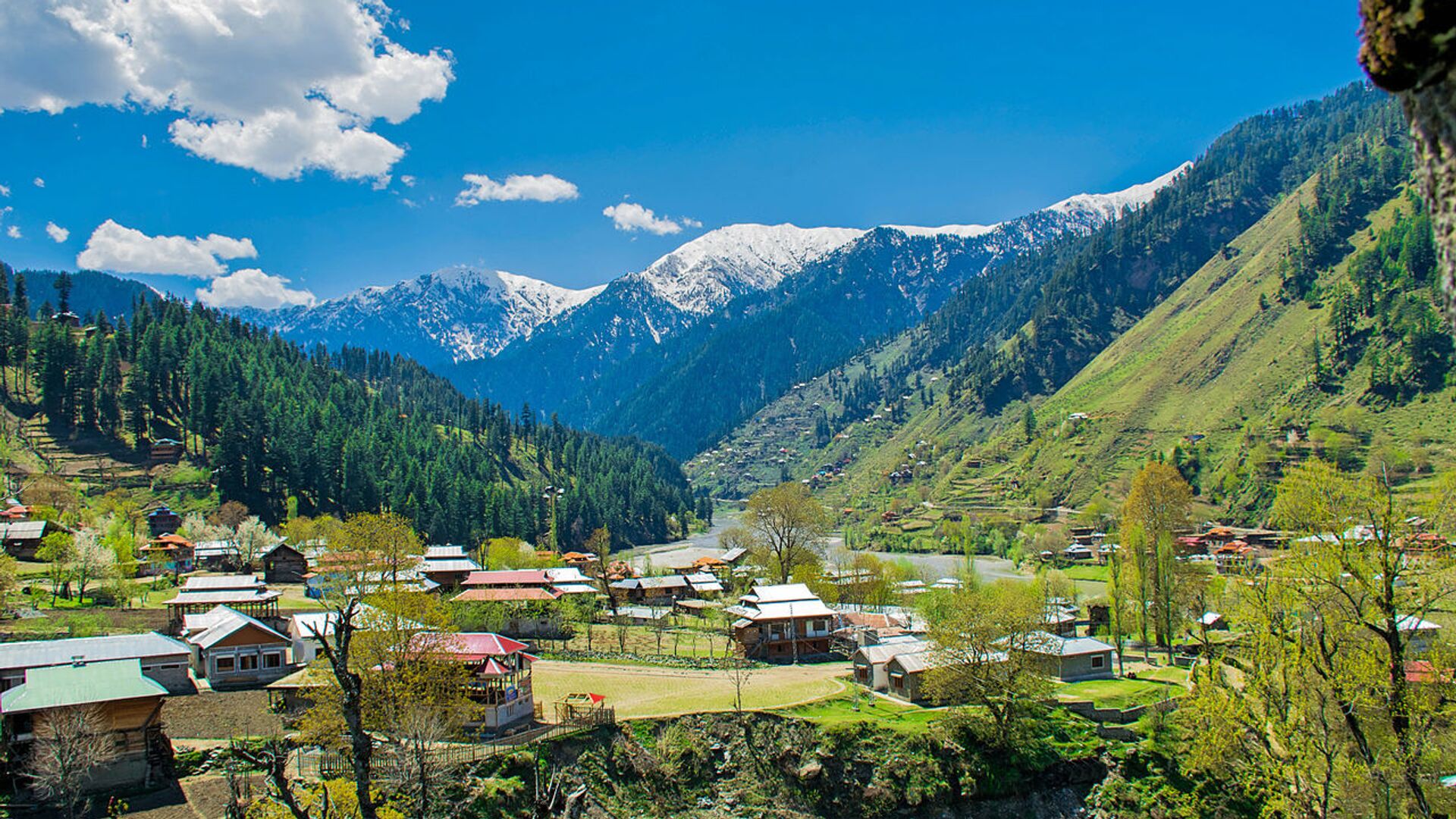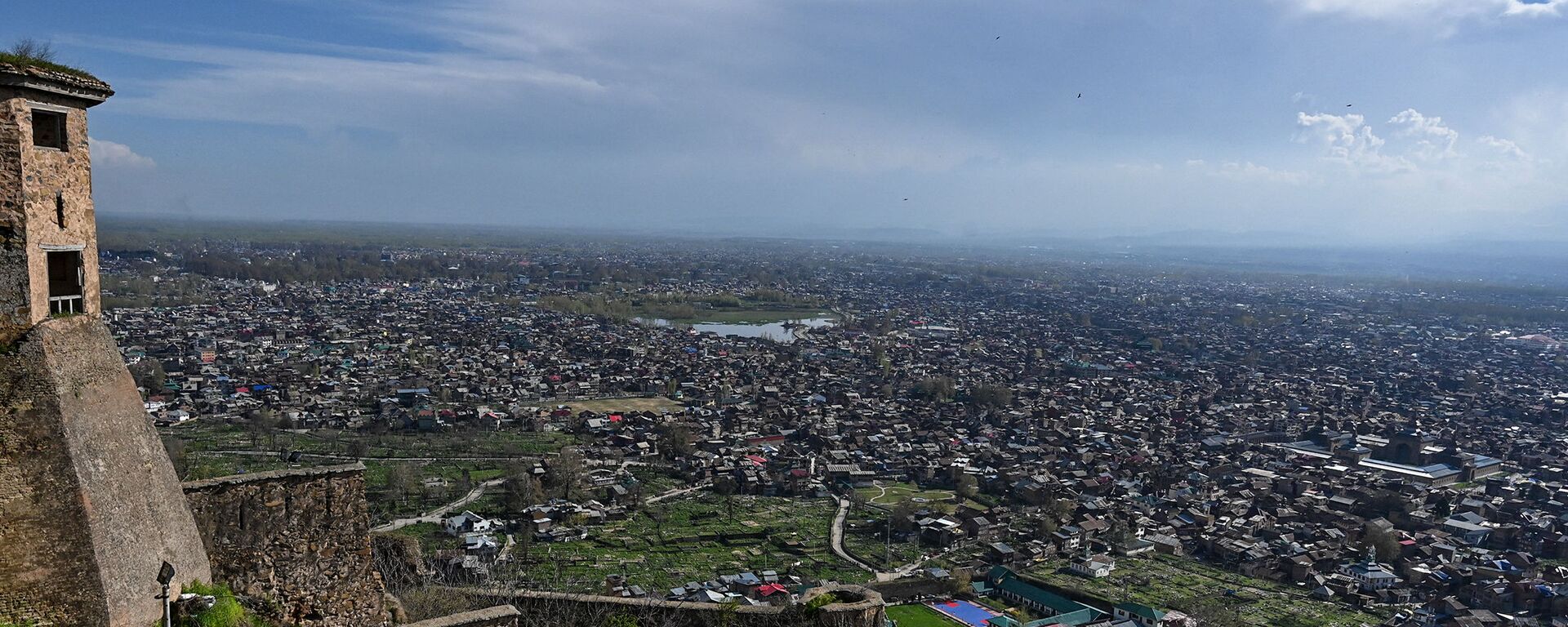https://sputnikglobe.com/20220424/pakistan-observes-black-day-to-protest-pm-modis-first-official-trip-to-jammu--kashmir-since-2019-1095007037.html
Pakistan Observes 'Black Day' to Protest PM Modi’s First Official Trip to Jammu & Kashmir Since 2019
Pakistan Observes 'Black Day' to Protest PM Modi’s First Official Trip to Jammu & Kashmir Since 2019
Sputnik International
The visit marked the first occasion that Indian Prime Minister Narendra Modi visited the erstwhile state of Jammu and Kashmir on an official trip since his... 24.04.2022, Sputnik International
2022-04-24T08:37+0000
2022-04-24T08:37+0000
2022-12-08T18:02+0000
narendra modi
imran khan
shehbaz sharif
kashmir
pakistan
https://cdn1.img.sputnikglobe.com/img/107818/01/1078180114_0:67:1280:787_1920x0_80_0_0_da94f87fc37525775b2ce4c4a120014f.jpg
Pakistan has called upon the people of Kashmir living on both sides of the Line of Control (LoC) to observe Indian Prime Minister Narendra Modi’s visit to Jammu as “black day”, as per Prime Minister of Pakistan-administered Kashmir Sardar Tanveer Ilyas.Both India and Pakistan control parts of Jammu and Kashmir region and both the nuclear-armed neighbours reject each other’s sovereignty over the region.Addressing a press conference in Islamabad along with Kashmir-centric group All Parties Hurriyat Conference (APHC) on Sunday, Ilyas said that demonstrations and protests will be taken across the entire Jammu and Kashmir region against New Delhi on Sunday.Ilyas also blasted the “Hindutva ideology” of the Indian government, stating that it posed a “serious threat” to peace in the region.The APHC is an umbrella group representing 26 political parties which advocate “freedom” of Kashmir. Its convenor Farooq Rehmani accused the Indian security forces of killing Kashmiris in large numbers, a reference to New Delhi’s crackdown on terrorist activity in the region.New Delhi accuses Pakistan of backing terrorist groups such as Jaish-e-Mohammed* (JeM) of carrying out attacks against security forces and civilians in the region.Over weekend, a fierce gunfight erupted between who Indian security agencies have described as “suicide bombers” who infiltrated from Pakistan.Jammu and Kashmir’s Director General of Police (DGP) Dilbag Singh said that the bombers were part of a squad pushed in by Pakistan to “disrupt” the prime minister’s visit.Subsequently, the security presence in the region was beefed up and police and security forces conducted joint patrolling in a bid to pre-empt any incident.Meanwhile, Pakistan's Foreign Office has subbed the encounter as "fake" and a "staged cordon-and-search operation".During the visit, Modi addressed the village councils of India on the occasion of National Panchayati Raj Day (Village councils day).The Indian PM also laid the foundation stones of multiple development and infrastructure projects totalling over $2 billion, including the Banihal Qazigund Road Tunnel, which will reduce the commuting time between Jammu and Kashmir regions of the state.Modi’s visit also comes after the swearing-in of Pakistan Prime Minister Shehbaz Sharif. His predecessor Imran Khan had been very critical of Prime Minister Modi over the decision to change the constitutional status of Jammu and Kashmir and bifurcate it into two Union Territories—Jammu and Kashmir and Ladakh.Islamabad has rejected the decision and downgraded its commercial and diplomatic ties with India in protest.*Jaish-e-Mohammed is designated as a terrorist group by many nations, including India, Pakistan, and Russia.
https://sputnikglobe.com/20210805/historic-day-modi-hails-his-kashmir-move-as-imran-slams-india-for-destroying-regional-stability-1083533243.html
kashmir
pakistan
Sputnik International
feedback@sputniknews.com
+74956456601
MIA „Rosiya Segodnya“
2022
News
en_EN
Sputnik International
feedback@sputniknews.com
+74956456601
MIA „Rosiya Segodnya“
Sputnik International
feedback@sputniknews.com
+74956456601
MIA „Rosiya Segodnya“
narendra modi, imran khan, shehbaz sharif, kashmir, pakistan
narendra modi, imran khan, shehbaz sharif, kashmir, pakistan
Pakistan Observes 'Black Day' to Protest PM Modi’s First Official Trip to Jammu & Kashmir Since 2019
08:37 GMT 24.04.2022 (Updated: 18:02 GMT 08.12.2022) The visit marked the first occasion that Indian Prime Minister Narendra Modi visited the erstwhile state of Jammu and Kashmir on an official trip since his government scrapped the semi-autonomous status of the region in August 2019.
Pakistan has called upon the people of Kashmir living on both sides of the Line of Control (LoC) to observe Indian Prime Minister Narendra Modi’s visit to Jammu as “black day”, as per Prime Minister of Pakistan-administered Kashmir Sardar Tanveer Ilyas.
Both India and Pakistan control parts of Jammu and Kashmir region and both the nuclear-armed neighbours reject each other’s sovereignty over the region.
Addressing a press conference in Islamabad along with Kashmir-centric group All Parties Hurriyat Conference (APHC) on Sunday, Ilyas said that demonstrations and protests will be taken across the entire Jammu and Kashmir region against New Delhi on Sunday.
Ilyas also blasted the “Hindutva ideology” of the Indian government, stating that it posed a “serious threat” to peace in the region.
“At a time when Kashmiris stand deprived even of the inconsequential rights of governance due to stripping of the special status of their state, when the Indian occupation forces have stepped up the worst ever atrocities, Modi’s visit amounts to rubbing salt into the wounds of Kashmiris,” he said.
The APHC is an umbrella group representing 26 political parties which advocate “freedom” of Kashmir. Its convenor Farooq Rehmani accused the Indian security forces of killing Kashmiris in large numbers, a reference to New Delhi’s crackdown on terrorist activity in the region.
New Delhi accuses Pakistan of backing terrorist groups such as Jaish-e-Mohammed* (JeM) of carrying out attacks against security forces and civilians in the region.
Over weekend, a fierce gunfight erupted between who Indian security agencies have described as “suicide bombers” who infiltrated from Pakistan.
Jammu and Kashmir’s Director General of Police (DGP) Dilbag Singh said that the bombers were part of a squad pushed in by Pakistan to “disrupt” the prime minister’s visit.
"The encounter took place two days ahead of the prime minister's visit. It is part of a big conspiracy to disturb the peaceful atmosphere of Jammu and it could be a big conspiracy to sabotage the visit," the DGP said on Saturday.
Subsequently, the security presence in the region was beefed up and police and security forces conducted joint patrolling in a bid to pre-empt any incident.
Meanwhile, Pakistan's Foreign Office has subbed the encounter as "fake" and a "staged cordon-and-search operation".
"Pakistan reiterates its call for investigation of extra-judicial killings in Jammu and Kashmir (India) by the Commission of Inquiry as recommended by the Office of the United Nations High Commissioner for Human Rights (OHCHR) in its Kashmir reports of 2018 and 2019," it said in a statement.
During the visit, Modi addressed the village councils of India on the occasion of National Panchayati Raj Day (Village councils day).
The Indian PM also laid the foundation stones of multiple development and infrastructure projects totalling over $2 billion, including the Banihal Qazigund Road Tunnel, which will reduce the commuting time between Jammu and Kashmir regions of the state.
Modi’s visit also comes after the swearing-in of Pakistan Prime Minister Shehbaz Sharif. His predecessor
Imran Khan had been very critical of Prime Minister Modi over the decision to change the constitutional status of Jammu and Kashmir and bifurcate it into two Union Territories—Jammu and Kashmir and Ladakh.
Islamabad has rejected the decision and downgraded its commercial and diplomatic ties with India in protest.
*Jaish-e-Mohammed is designated as a terrorist group by many nations, including India, Pakistan, and Russia.





